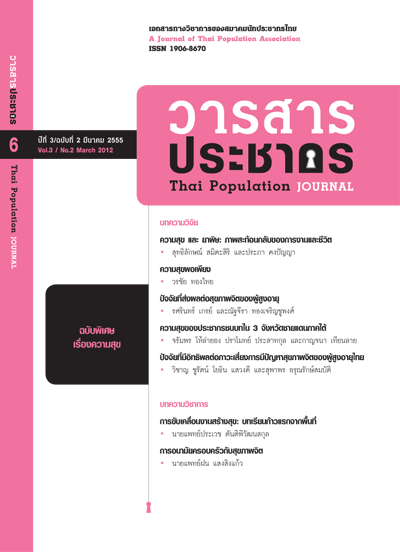ปีที่ 3 ฉบับที่ 2 เดือนมีนาคม 2555
 |
บทความวิจัย
บทความวิชาการ
|
ความสุข และ ยาพิษ: ภาพสะท้อนกลับของการงานและชีวิต
สุทธิลักษณ์ สมิตะสิริ และประภา คงปัญญา
บทคัดย่อ
บทความนี้เป็นการบรรยายประสบการณ์จากการดำเนินโครงการพัฒนาและวิจัยเพื่อส่งเสริมสุขภาวะในระดับอำเภอของนักวิจัยในมหาวิทยาลัยคนหนึ่ง ผู้เขียนเลือกใช้การมองสะท้อนกลับด้วยการวิจัยตนเองเพื่ออธิบายกระบวนการเรียนรู้และความพยายามของบุคคลในการทำความเข้าใจ “ความสุข” ทั้งจากการงาน และชีวิต เรื่องราวเช่นที่นำเสนอชี้ถึงองค์ความรู้เกี่ยวกับแนวทางการประยุกต์ใช้ความรู้ ปัจจัยและเงื่อนไขบางอย่างที่สำคัญแต่ซ่อนอยู่ และความเข้มแข็งทางจิตวิญญาณของผู้เล่า ผลของการดำเนินการเช่นนี้จึงเป็นทั้งกระบวนการและผลผลิตของการเรียนรู้ โดยมีเป้าหมายเพื่อสนับสนุนและส่งเสริมให้ผู้อ่านได้รับ “ประสบการณ์จากประสบการณ์” ซึ่งอาจจูงใจให้มีการเล่าประสบการณ์ที่เกี่ยวข้องกับการพัฒนาความสุขมากขึ้น อันจะส่งผลต่อการเพิ่มพูนความรู้และปัญญาในสังคมซึ่งมีความจำเป็นต่อความก้าวหน้าของความสุขและความเป็นอยู่ที่ดีของประชากรไทย
ทั้งในระดับชุมชนและระดับบุคคล
คำสำคัญ: ความสุข การพัฒนา การวิจัยตนเอง ชุมชนเป็นฐาน พุทธมณฑล
HAPPINESS AND POISON: REFLECTIONS ON WORK AND LIFE
Suttilak Smitasiri and Prapa Kongpunya1
Abstract
This article is a personal narrative of a university researcher’s experience in conducting a district-wide happiness promotion development and research program. Autoethnographic reflections are used to describe a learning process and a person’s attempt to understand “happiness” in the context of both work and life. Stories such as this demonstrate the “how” of the application of knowledge, underlying issues and spiritual strength of the teller. Results of this exercise are both a process and a product. The aim is to encourage readers to “experience an experience” that might motivate them to give voice to their own experiences in order
to increase knowledge and wisdom necessary to advance happiness and well-being of the Thai population, at both community and individual levels.
Keywords: Happiness Development Autoethnography Community-based Phutthamonthon
1 Institute of Nutrition, Mahidol Universityความสุขพอเพียง
วรชัย ทองไทย2
บทคัดย่อ
ปัจจุบันคนไทยมีความสุขน้อยกว่าแต่ก่อน เพราะหลงอยู่ในความสุขแบบบริโภคนิยม ซึ่งเป็นความสุขชั่วคราว และจะนำไปสู่ความทุกข์ในระยะยาวได้ หนทางแก้ไขคือ การหันกลับไปหาความสุขที่มีอยู่แล้วในวัฒนธรรมดั้งเดิมของไทย ได้แก่ คิหิสุข (สุขของคฤหัสถ์) หรือ ความสุขพอเพียง
พุทธศาสนาเป็นศาสนาแห่งความสุข และมีคำสอนเกี่ยวกับความสุขมากมายหลายระดับ มีทั้งคำสอนสำหรับผู้ครองเรือน หรือผู้ที่ยังดำรงชีวิตอยู่ในสังคม ซึ่งเป็นคำสอนเพื่อประโยชน์ทางวัตถุ และเพื่อความสุขในปัจจุบัน นอกจากนี้ยังมีคำสอนสำหรับผู้สละเรือนแล้วซึ่งเป็นคำสอนเพื่อประโยชน์ลึกซึ้งทางจิตใจและความสุขสูงสุด
การส่งเสริมให้คนไทยหันมาสนใจกับความสุขพอเพียงนั้น นักวิจัยต้องทำให้เห็นในเชิงประจักษ์ว่า ความสุขพอเพียงเป็นความสุขที่แท้จริงและยั่งยืน โดยทำวิจัยเพื่อพิสูจน์สมมุติฐาน 4 ข้อ คือ 1) รายได้ที่ได้มาโดยสุจริตทำให้มีความสุข 2) รายจ่ายที่ประกอบด้วยปัญญาทำให้มีความสุข 3) การไม่มีหนี้สินทำให้มีความสุข และ 4) การประพฤติที่ไม่มีโทษทำให้มีความสุข
คำสำคัญ: ความสุข ความสุขพอเพียง ความสุขที่ยั่งยืน ความสุขในพุทธศาสนา ความต้องการ บทบาทของนักวิจัย
Sufficient Happiness
Varachai Thongthai2
Abstract
Nowadays Thai people are less happy than before, due to seeking happiness from consumption. Whilst consumption brings instant happiness, it will lead to suffering in the long run. The solution is by seeking happiness from Thai tradition that is Gihisukha (house-life happiness) or sufficient happiness.
Buddhism is the religion of happiness. There are a lot of discourses about happiness. These discourses cover all walks of life, ranging from laypersons who seek materials and current happiness to monks who seek spiritual gain and supreme happiness.
In convincing Thai people to seek sufficient happiness, researchers have to demonstrate that sufficient happiness is a true and sustainable happiness. They should do empirical studies, which include four hypotheses; 1) uprightness income is happiness, 2) wisdom spending is happiness, 3) debtlessness is happiness, and 4) faultless life is happiness.
Keywords: happiness, sufficient happiness, sustainable happiness, happiness in Buddhism, want, researcher’s role.
2 Institute for Population and Social Research, Mahidol Universityปัจจัยที่ส่งผลต่อสุขภาพจิตของผู้สูงอายุ
รศรินทร์ เกรย์ และณัฐจีรา ทองเจริญชูพงศ์2
บทคัดย่อ
ผู้สูงอายุทีมีปัญหาสุขภาพจิต ส่งผลต่อความเสี่ยงการเกิดภาวะทุพลภาพและภาวะการตาย ดังนั้น การศึกษานี้มีวัตถุประสงค์เพื่อศึกษาถึงปัจจัยที่มีผลต่อสุขภาพจิตของผู้สูงอายุไทย โดยใช้ข้อมูลจากการสำรวจอนามัยและสวัสดิการ พ.ศ. 2554 ของสำนักงานสถิติแห่งชาติ พบว่ามีประชากรตัวอย่างอายุ 60 ปีขึ้นไปจำนวน 6,952 คน สุขภาพจิตวัดโดยชุดข้อถามสั้นจำนวน 15 ข้อของกรมสุขภาพจิต (TMHI.15) ผลการศึกษาโดยสถิติถดถอยแบบพหุ พบว่าปัจจัยทางประชากร ได้แก่ อายุ และสถานภาพสมรส ปัจจัยทางเศรษฐกิจและสังคม ได้แก่ การศึกษา การทำงาน เศรษฐานะของครัวเรือน และปัจจัยทางสุขภาพ ได้แก่ การรับรู้ภาวะสุขภาพ การปฏิบัติกิจวัตรประจำวัน ประเภทของสวัสดิการรักษาพยาบาล และการออกกำลังกาย ส่งผลต่อสุขภาพจิตของผู้สูงอายุอย่างมีนัยสำคัญทางสถิติ ดังนั้น นโยบายการให้โอกาสผู้สูงอายุในการทำงาน การลดความเหลื่อมล้ำ ของสวัสดิการรักษาพยาบาล และการส่งเสริมการออกกำลังกายที่เหมาะสมกับวัย จึงควรได้รับการส่งเสริม
คำสำคัญ: ความสุข ผู้สูงอายุ สุขภาพจิต
Determinants of mental health among older persons
Rossarin Gray and Natjera Thongcharoenchupong2
Abstract
Consequence of poor mental health of older persons is increasing risk of their disabilities and mortality. This study, thus, aims at exploring factors affecting mental health among older persons in Thailand. Data are from the Health and Welfare Survey carried out by the National Statistical Office in 2011. The sample included 6,952 population aged 60 years and over. Short format of Thai Mental Health Indicators including 15 questions of the Department of Mental Health (TMHI.15) was used. Based on multiple regression analysis, the results revealed that demographic factors including age and marital status, socioeconomic factors including education, work and household economic status and health factors including self-rated health, activities daily living, types of health welfare and exercise predicted the level of mental health statistically significantly. Policy on opportunities for work, reducing health welfare inequality and appropriate exercise among older adults should be promoted.
Keywords: Happiness, Mental health, Older persons,
2 Institute for Population and Social Research, Mahidol University